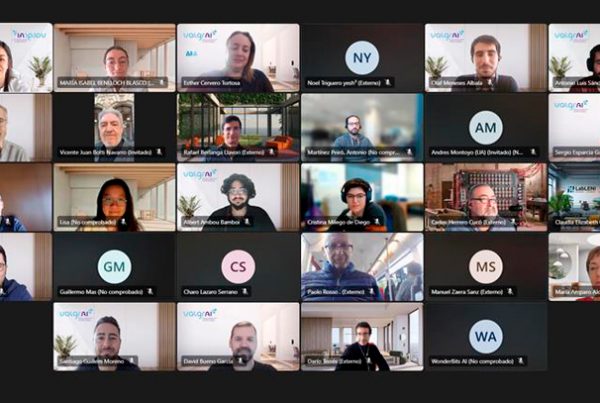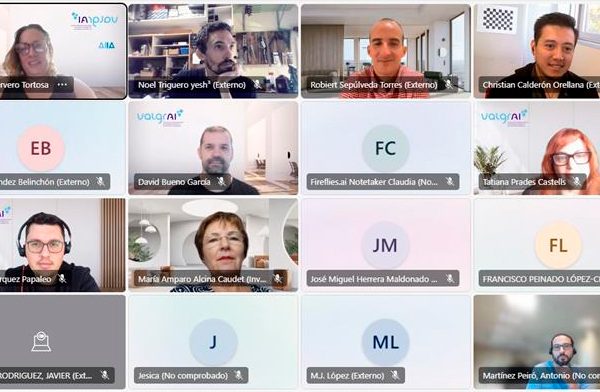ValgAI is organizing the fourth edition of this series of lectures, focusing on pioneering projects for revitalizing towns, digitization, restoring photos damaged by the DANA storm, and supporting senior citizens.
Valencia, 24 September 2025. The ValgrAI Foundation has held the fourth edition of AIIA Innovation Day at Las Naves in Valencia. This event, which is part of the Artificial Intelligence Innovation Alliance (AIIA) project, brought together pioneering projects to demonstrate how Artificial Intelligence (AI) is transforming society, the economy, and people’s lives in the Valencian Community. The Director General of ValgrAI, Vicent Botti, highlighted the fundamental role that ValgrAI plays as a unifying force and driver of the application of Artificial Intelligence in improving citizen well-being.
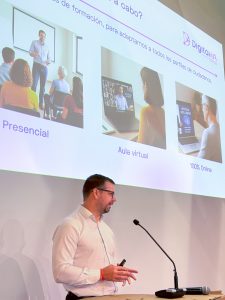
David Bueno, coordinator of the Digital-IA project led by ValgrAI with the support of the Valencian Regional Government and financed with Next Generation funds, explained that this initiative consists of providing digital and artificial intelligence training to citizens in municipalities with fewer than 20,000 inhabitants that are not under the influence of a functional urban area. Both face-to-face and online courses will be offered to senior citizens, the unemployed, children, and anyone interested in learning about AI.
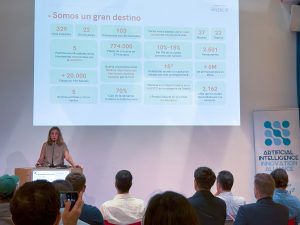
Maricruz Cádiz, deputy director of Tourism Development and Innovation at the Visit València Foundation since 2024, presented the SmartTourFlow challenge, which proposes the development of digital tools based on big data, artificial intelligence, digital twins, and IoT to anticipate and manage tourist flows in the city. The initiative seeks to balance tourism growth with residents’ quality of life, enabling real-time identification of the busiest areas, preventing overcrowding and optimising the planning of public services such as transport, cleaning and security. In addition, the project will facilitate data-driven decision-making and trend forecasting, reinforcing Valencia’s sustainable tourism model.
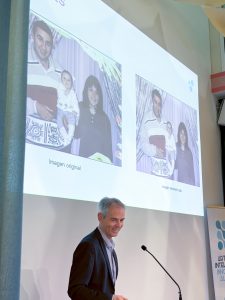
Cèsar Ferri Ramírez, professor at the UPV and member of the VRAIN and ValgrAI research groups, gave a presentation entitled ‘Recuperem les fotos’ (Let’s recover the photos), in which he explained a project using artificial intelligence for the digital restoration of photographs damaged by the DANA storm that affected the Valencian Community in October 2024. The initiative combines state-of-the-art models such as YOLOv8, SAM2 and Stable Diffusion Inpainting to clean up stains, reconstruct images and preserve the identity of the people portrayed. More than 200,000 images have been received in this collaborative process, which not only recovers photos, but also memories and collective memory, demonstrating the value of AI applied to social and humanitarian purposes.
AI at the service of the Valencian people.
Darío Darío Terrés Cayuelas, CEO and co-founder of WonderBits, has presented the ‘Revital-IA Platform: Artificial Intelligence for the socio-economic revitalisation of small and medium-sized municipalities in Valencia’, a project to combat depopulation, revitalise community life, and modernise public services in small and medium-sized municipalities.
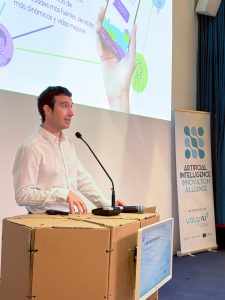
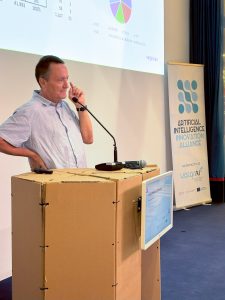
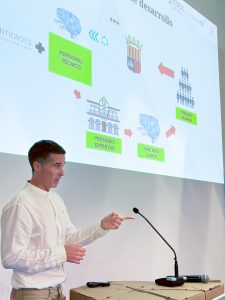
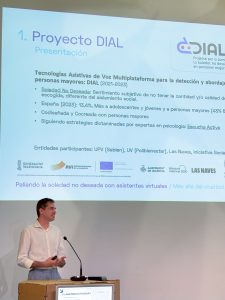
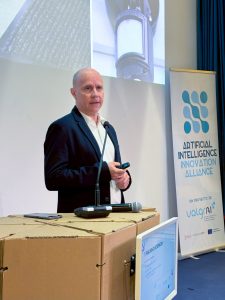
Professor Francisco Flórez-Revuelta from the University of Alicante presented an ethical and privacy-friendly video surveillance system for remote monitoring of elderly people. The solution combines computer vision, sensors, and artificial intelligence to detect falls, analyse gait, monitor physiological signals, and recognise emotions, while always preserving privacy. This approach, aligned with European projects such as EMA-Frailty (2025-2028), seeks to enhance safety, reduce stress on families, and optimise healthcare and care resources.
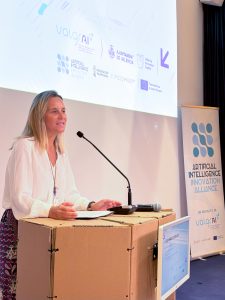
The conference was closed by Paula Llobet, Councillor for Tourism, Innovation and Investment at Valencia City Council, who stressed that ‘projects such as those presented at this conference are proof that AI, when used properly, improves people’s lives’. The councillor explained the numerous public policies that are being implemented to apply the most disruptive technologies to serve citizens. In fact, she highlighted the importance of the Valencia Innovation Capital project and the first sandbox ordinance that has turned Valencia into the first urban laboratory, as well as the promotion of public-private initiatives to make Valencia ‘a more resilient and safer city that puts its residents at the centre’.
ValgrAI (Valencian Graduate School and Research Network of Artificial Intelligence) is a non-profit foundation formed by the Valencian Regional Government, the five public universities of the Valencian Community (UV, UPV, UA, UJI, and UMH), and companies in the sector. It coordinates study and research into artificial intelligence in the Valencian Community to respond to the technological needs of companies and promote the creation of new talent in artificial intelligence, thereby renewing the productive model of the Valencian Community.
The project seeks cooperation between knowledge generators (teachers and researchers), companies, and productive sectors interested in this technology, with the aim of turning the Valencian Community into a centre of excellence in Artificial Intelligence technologies.


